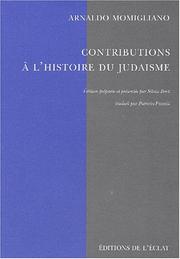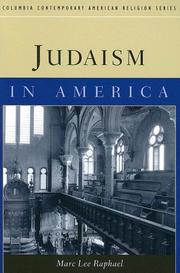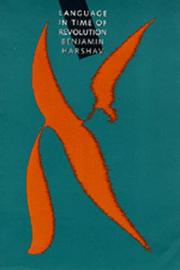| Listing 1 - 10 of 10 |
Sort by
|

ISBN: 9782841620562 2841620565 Year: 2002 Publisher: Paris : Eclat,
Abstract | Keywords | Export | Availability | Bookmark
 Loading...
Loading...Choose an application
- Reference Manager
- EndNote
- RefWorks (Direct export to RefWorks)
Spécialiste d'histoire ancienne de renommée internationale, Arnaldo Momigliano (1908-1987) a consacré une partie de ses travaux aux relations du judaïsme avec le monde grec et romain et avec la société moderne. Né dans une illustre famille juive piémontaise, il a dû quitter l'Italie à la suite des lois raciales de 1938, et a enseigné à Bristol, Oxford, Londres et Chicago. A travers son travail d'historien, il est souvent revenu sur la question du rapport des juifs à leurs terres d'" accueil ", comme sur celle de l'articulation des Sagesses barbares au corps des nations constituées. Ainsi, depuis les premières études sur Flavius Josèphe en 1931, jusqu'aux dernières conférences de 1986 sur les apocalypses ou la prophétie dans la tradition juive, ces Contributions à l'histoire du judaïsme se présentent comme l'autobiographie intellectuelle d'un homme qui a toujours été fidèle à la loi de ses pères comme à son appartenance à la nation qu'ils ont contribué à fonder
Judaism --- Jewish scholars. --- Judaïsme --- Savants juifs --- Historiography. --- Historiographie --- Judaisme --- Judaïsme --- History of Judaism --- Judaisme - Historiographie

ISBN: 0231120613 Year: 2003 Publisher: New York Columbia University Press
Abstract | Keywords | Export | Availability | Bookmark
 Loading...
Loading...Choose an application
- Reference Manager
- EndNote
- RefWorks (Direct export to RefWorks)
Judaism --- America --- American Judaism --- beliefs --- festivals --- life-cycle events --- history of Judaism --- American Jewish religious activity --- the Synagogue --- Judaic thinkers --- tradition
Book
ISBN: 9780415440080 9780415440097 0415440084 0415440092 Year: 2009 Publisher: Abingdon, Oxon Routledge
Abstract | Keywords | Export | Availability | Bookmark
 Loading...
Loading...Choose an application
- Reference Manager
- EndNote
- RefWorks (Direct export to RefWorks)
Jewish religion --- Judaism --- History. --- Customs and practices. --- Doctrines. --- Judaism - History. --- Judaism - Customs and practices. --- Judaism - Doctrines. --- history of Judaism --- religionthe Bible --- the Jewish religion --- Jewish beliefs --- Jewish practices --- theology --- ideology --- spirituality --- mysticism --- scholasticism --- folk religion --- monotheism
Periodical
Abstract | Keywords | Export | Availability | Bookmark
 Loading...
Loading...Choose an application
- Reference Manager
- EndNote
- RefWorks (Direct export to RefWorks)
Religious studies --- Judaism --- Judaïsme --- History --- Periodicals --- Histoire --- Périodiques --- Post-exilic period (Judaism) --- 586 B.C.-210 A.D --- 22 <05> --- Bijbel--Tijdschriften --- Arts and Humanities --- Literature --- Religion --- Jews --- Hellenistic Judaism --- Judaism, Hellenistic --- Post-exilic Period (Judaism) --- Religions --- Semites --- History of Judaism. --- Judaizm
Book
ISBN: 0520971833 Year: 2020 Publisher: Berkeley, CA : University of California Press,
Abstract | Keywords | Export | Availability | Bookmark
 Loading...
Loading...Choose an application
- Reference Manager
- EndNote
- RefWorks (Direct export to RefWorks)
Though ancient rabbinic texts are fundamental to analyzing the history of Judaism, they are also daunting for the novice to read. Rabbinic literature presumes tremendous prior knowledge, and its fascinating twists and turns in logic can be disorienting. Rabbinic Drinking helps learners at every level navigate this brilliant but mystifying terrain by focusing on rabbinic conversations about beverages, such as beer and wine, water, and even breast milk. By studying the contents of a drinking vessel—including the contexts and practices in which they are imbibed—Rabbinic Drinking surveys key themes in rabbinic literature to introduce readers to the main contours of this extensive body of historical documents.Features and Benefits:Contains a broad array of rabbinic passages, accompanied by didactic and rich explanations and contextual discussions, both literary and historicalThematic chapters are organized into sections that include significant and original translations of rabbinic textsEach chapter includes in-text references and concludes with a list of both referenced works and suggested additional readings
Drinking in rabbinical literature. --- beer. --- beverages. --- breast milk. --- broad array of rabbinic passages. --- contextual discussions. --- drinking vessel. --- fascinating twists and turns. --- historical. --- history of judaism. --- jewish. --- jews. --- judaism. --- literary. --- logic. --- mystifying terrain. --- rabbinic conversations. --- rabbinic texts. --- rabbis. --- rich explanations. --- studying drinking. --- water. --- wine.
Book
ISBN: 9780520295926 0520295927 0520968662 9780520968660 Year: 2017 Publisher: Oakland, California
Abstract | Keywords | Export | Availability | Bookmark
 Loading...
Loading...Choose an application
- Reference Manager
- EndNote
- RefWorks (Direct export to RefWorks)
"Blood for Thought delves into a relatively unexplored area of rabbinic literature: the vast corpus of laws, regulations, and instructions pertaining to sacrificial rituals. Mira Balberg traces and analyzes the ways in which the early rabbis interpreted and conceived of biblical sacrifices, reinventing them as a site through which to negotiate intellectual, cultural, and religious trends and practices in their surrounding world. Rather than viewing the rabbinic project as an attempt to generate a nonsacrificial version of Judaism, she argues that the rabbis developed a new sacrificial Jewish tradition altogether, consisting of not merely substitutes to sacrifice but elaborate practical manuals that redefined the processes themselves, radically transforming the meanings of sacrifice, its efficacy, and its value."--Provided by publisher.
Sacrifice --- Blood --- Rabbinical literature --- Rabbis --- Judaism --- Jews --- Jewish rabbis --- Judaism. --- Religious aspects --- History and criticism. --- Liturgy. --- Ritual --- Rituals --- Blut. --- Judentum. --- Opfer. --- Rabbinical literature. --- Rabbinische Literatur. --- Rabbis. --- Middle East --- Worship (Judaism) --- Clergy --- Jewish scholars --- Body fluids --- Fear of blood --- Religious aspects&delete& --- History and criticism --- Liturgy --- Functionaries --- bible. --- biblical sacrifices. --- christianity. --- cultural. --- different worldview. --- history of judaism. --- instructions. --- intellectual. --- jewish life. --- judaism. --- laws. --- practical manuals. --- rabbinic literature. --- rabbis. --- regulations. --- religion. --- religious trends. --- sacrifice. --- sacrificial jewish tradition. --- sacrificial rituals. --- sacrificial system. --- temple. --- torah.

ISBN: 0520912969 0585078823 9780520912960 9780585078823 0520079582 Year: 1993 Publisher: Berkeley University of California Press
Abstract | Keywords | Export | Availability | Bookmark
 Loading...
Loading...Choose an application
- Reference Manager
- EndNote
- RefWorks (Direct export to RefWorks)
This text on culture and consciousness in history concerns the worldwide transformations of Jewish culture and society and the revival of the ancient Hebrew language following the waves of pogroms in Russia in 1881, when large numbers of Jews in Eastern and Central Europe redefined their identity as Jews in a new and baffling world.
Hebrew language --- Jews --- Languages & Literatures --- Middle Eastern Languages & Literatures --- Jewish learning and scholarship --- Revival. --- Cultural assimilation. --- Intellectual life. --- Revival --- Cultural assimilation --- Intellectual life --- ancient hebrew. --- ashkenazi. --- cultural history. --- hebrew language. --- hebrew revival. --- hebrew translations. --- history of israel. --- history of judaism. --- israeli lit. --- jewish assimilation. --- jewish culture. --- jewish family. --- jewish history. --- jewish ideology. --- jewish life. --- jewish readers. --- jewish studies. --- jewish. --- judaism. --- linguistics books. --- modern jewish revolution. --- religion and lingusitics. --- religion. --- religious historian. --- religious literature. --- religious revolution. --- religious studies. --- social revolution. --- the torah.
Book
ISBN: 1283278499 9786613278494 0520950275 9780520950276 6613278491 9780520253216 0520253213 9780520286276 0520286278 Year: 2011 Publisher: Berkeley University of California Press
Abstract | Keywords | Export | Availability | Bookmark
 Loading...
Loading...Choose an application
- Reference Manager
- EndNote
- RefWorks (Direct export to RefWorks)
Foreigners and Their Food explores how Jews, Christians, and Muslims conceptualize "us" and "them" through rules about the preparation of food by adherents of other religions and the act of eating with such outsiders. David M. Freidenreich analyzes the significance of food to religious formation, elucidating the ways ancient and medieval scholars use food restrictions to think about the "other." Freidenreich illuminates the subtly different ways Jews, Christians, and Muslims perceive themselves, and he demonstrates how these distinctive self-conceptions shape ideas about religious foreigners and communal boundaries. This work, the first to analyze change over time across the legal literatures of Judaism, Christianity, and Islam, makes pathbreaking contributions to the history of interreligious intolerance and to the comparative study of religion.
Food --- Identification (Religion) --- Religions --- Jews --- Muslims --- Religious aspects --- Relations. --- Dietary laws. --- Christianity. --- animal slaughter. --- bible and food. --- biblical dietary laws. --- christian history. --- christianity. --- christians and food. --- dietary laws. --- history of islam. --- history of judaism. --- history of religion. --- islam. --- judaism and food. --- judaism. --- kosher foods. --- lent and fasting. --- muslim history. --- muslims and food. --- ramadan. --- religion and fasting. --- religion and food. --- religion comparative study. --- religions and eating. --- religious fasting. --- religious food preparation. --- religious food restrictions. --- religious history. --- religious studies.
Book
ISBN: 9783110452112 3110452111 9783110454314 9783110453171 3110454319 3110453177 9783110607468 3110607468 Year: 2016 Volume: 488 Publisher: Berlin Boston
Abstract | Keywords | Export | Availability | Bookmark
 Loading...
Loading...Choose an application
- Reference Manager
- EndNote
- RefWorks (Direct export to RefWorks)
What was Judaean religion in the Persian period like? Is it necessary to use the Bible to give an answer to the question? Among other things the study argues that • the religion practiced in the 5th c. BCE Elephantine community and which is reflected in the so-called Elephantine documents represent a well-attested manifestation of lived Persian period Yahwism,• as religio-historical sources, the Elephantine documents reveal more about the actual religious practice of the Elephantine Judaeans than what the highly edited and canonised texts of the Bible reveal about the religious practice of the contemporary Yahwistic coreligionists in Judah, and• the image of the Elephantine Judaism emerging from the Elephantine documents can revise the canonised image of Judaean religion in the Persian period (cf. A. Assmann). The Elephantine Yahwism should not be interpreted within a framework dependent upon theological, conceptual and spatial concepts alien to it, such as biblical ones. The study proposes an alternative framework by approaching the Elephantine documents on the basis of N. Smart’s multidimensional model of religion. Elephantine should not be exotified but brought to the very centre of any discussion of the history of Judaism.
Judaism --- Judaea (Region) --- History --- Religion --- Achaemenid dynasty, --- 933.31 --- 933.31 Geschiedenis van het Joodse volk: Galilea en Judea in de Perzische tijd--(tot aan Alexander de Grote) --- Geschiedenis van het Joodse volk: Galilea en Judea in de Perzische tijd--(tot aan Alexander de Grote) --- Jews --- Religions --- Semites --- Hellenistic Judaism --- Judaism, Hellenistic --- Erets Yehudah (Region) --- Ereẓ Yehudah (Region) --- Judah, Land of (Region) --- Judea (Region) --- Land of Judah (Region) --- Yahūdhā (Region) --- Yehuda (Region) --- Religion. --- Judaism - History - Post-exilic period, 586 B.C.-210 A.D. --- Judaea (Region) - Religion --- Judaism - Egypt - Elephantine --- Achaemenid dynasty, - 559 B.C.-330 B.C. --- Elephantine. --- Yahwism. --- history of Judaism. --- multidimensional model of religion.
Book
ISBN: 0520958217 9781461957195 1461957192 9780520958210 1306402743 9781306402743 9780520280632 0520280636 Year: 2014 Publisher: Berkeley University of California Press
Abstract | Keywords | Export | Availability | Bookmark
 Loading...
Loading...Choose an application
- Reference Manager
- EndNote
- RefWorks (Direct export to RefWorks)
This book explores the ways in which the early rabbis reshaped biblical laws of ritual purity and impurity and argues that the rabbis' new purity discourse generated a unique notion of a bodily self. Focusing on the Mishnah, a Palestinian legal codex compiled around the turn of the third century CE, Mira Balberg shows how the rabbis constructed the processes of contracting, conveying, and managing ritual impurity as ways of negotiating the relations between one's self and one's body and, more broadly, the relations between one's self and one's human and nonhuman environments. With their heightened emphasis on subjectivity, consciousness, and self-reflection, the rabbis reinvented biblically inherited language and practices in a way that resonated with central cultural concerns and intellectual commitments of the Greco-Roman Mediterranean world. Purity, Body, and Self in Early Rabbinic Literature adds a new dimension to the study of practices of self-making in antiquity by suggesting that not only philosophical exercises but also legal paradigms functioned as sites through which the self was shaped and improved.
Rabbinical literature --- Purity, Ritual --- Immersion (Judaism) --- Purity, Ritual (Judaism) --- History and criticism. --- Judaism. --- 233.55 --- 236.1 --- 296*6 --- 296.2 --- 236.1 Dood. Scheiding van lichaam en ziel --- Dood. Scheiding van lichaam en ziel --- 233.55 Eenheid van lichaam en ziel bij de mens --- Eenheid van lichaam en ziel bij de mens --- 296*6 Joodse theologie en filosofie--(algemeen) --- Joodse theologie en filosofie--(algemeen) --- 296.2 Antisemitisme --- Antisemitisme --- Judaism --- History and criticism --- ancient judaism. --- antiquity. --- bible. --- biblical language. --- biblical law. --- biblical practices. --- bodily self. --- consciousness. --- cultural studies. --- early rabbis. --- greco roman mediterranean world. --- history of judaism. --- human environment. --- jewish studies. --- judaism. --- mishnah. --- nonhuman environment. --- palestinian legal codex. --- philosophy of halakah. --- rabbinic texts. --- religion. --- religious studies. --- religious. --- ritual impurity. --- ritual purity. --- s mark taper foundation imprint in jewish studies series. --- self making. --- self reflection. --- spiritual. --- subjectivity.
| Listing 1 - 10 of 10 |
Sort by
|

 Search
Search Feedback
Feedback About UniCat
About UniCat  Help
Help News
News